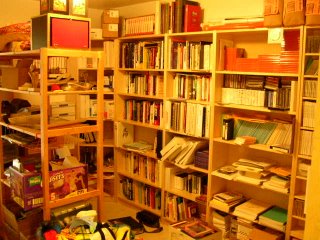My wife doesn't seem to have this problem as bad as I do. She seems to be able to mentally shift gears and carry on two conversations at the same time, but I just can't do it. She says it's a female thing. That their brains are wired differently than a man's brain. Maybe so, but she doesn't write as much as I do.
So, in order for me to be able to really finish a writing project in a timely manner, I have to be able to write where the phone, e-mail, and family aren't able to interrupt. If you are a writer, I cannot stress how important it is not to allow interruptions. Writers argue about the best time of day to write, about the benefits of pen and paper vs. computer keyboard, and about grammar and spelling, but the one thing all prolific writers seem to agree on is the need for uninterrupted time in order to produce.

So, I created a "secret" chamber in my library. In another post I wrote about and showed a picture of how we converted a bed room into a library with floor to ceiling book shelves on every wall. The closet in this room was used to store boxes of other books, which I moved to the guest room. The library closet was cleaned out (sort of) and a makeshift desk was made. In here I can take my lap top, set up, and know that I am insulated from distraction.
I don't use it very often, but when I do, it is amazing how much I can get done.
I sometimes feel a little bit "Harry Potter-ish" locked away in the closet, but it works for getting stuff written.
--Julian Franklin
P.S. The book leaning against the dictionary and Thesaurus on the desk in the photo is a copy of my newest book "Kid Control: Behavior Management for Children's Entertainers". You can check out a little bit about the book at www.JulianFranklin.com/kidcontrol.htm

